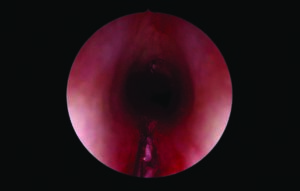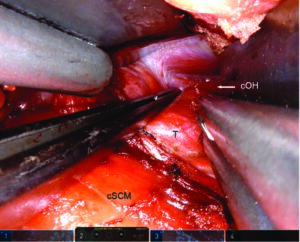Clinical suspicion of acute invasive fungal rhinosinusitis (AIFR) among COVID-19 patients and early management with antifungal therapy and surgical debridement is essential for better outcomes and higher survival.
Vocal Cord Leukoplakia Management Trends Include Advanced Surgical Techniques, Voice Preservation
Here’s what a detailed literature review related to the epidemiology, diagnosis, and management of vocal cord leukoplakia reveal about oncologic outcomes, voice preservation, and current and emerging techniques.

Is Betahistine Effective in the Treatment of Ménière’s Disease?
Though some studies show benefit, high-quality data demonstrating the efficacy of betahistine in the treatment of MD is absent.

What Is the Utility of Genetic Testing in Indeterminate Thyroid Nodules?
In addition to helping the patient avoid unnecessary diagnostic surgery, these assessments may provide critical insight as well as offer contemporary personalized treatment options for advanced disease.

What Is the Right Treatment for Adults with Unilateral Deafness?
Current options for hearing rehabilitation offer different advantages to patients with single-sided deafness, and no single modality is clearly superior to the others.

How To: Endoscopic Anterior and Posterior Cricoid Split for Bilateral Vocal Fold Paralysis
Endoscopic anterior and posterior cricoid split (EAPCS) has emerged as an alternative that is nondestructive and can offer a long-lasting solution to congenital BVFP while avoiding tracheostomy.

How To: Technique, Pitfalls of the Transaxillary Approach for Robotic Thyroidectomy
Advantages of thyroidectomy using transaxillary robotic surgery (TARS) are cosmetic, a high-definition view of structures, and a reduced risk of compressive cervical hematoma; the main drawbacks are the cost and duration of the procedure

Is Vestibular Testing Necessary? Here’s What Experts Say
Panelists at the 2021 American Academy of Otolaryngology–Head and Neck Surgery (AAO-HNS) Annual Meeting discussed how to avoid unnecessary testing and when, exactly, vestibular tests are needed.
Maximum Spirometric Value Changes Predict Surgery Need in Patients with Recurrent Laryngotracheal Stenosis
The deviation from overall spirometric maximums has the strongest predictive power in determining the need to return to surgery.

Margin Recommendations for Cutaneous Malignancies in Immunocompetent and Immunocompromised Patients
For low-risk cSCC, 4 to 6 mm margins are recommended, whereas for low-risk BCC, the recommendation is for 4 mm margins.
- « Previous Page
- 1
- …
- 4
- 5
- 6
- 7
- 8
- …
- 35
- Next Page »